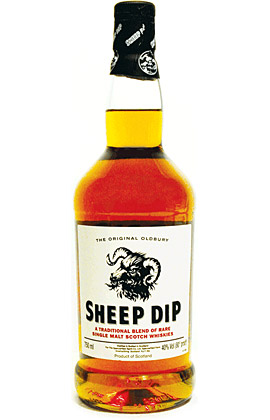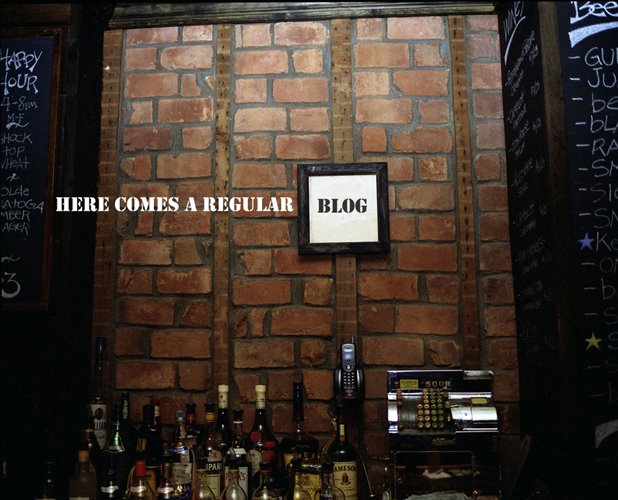
The heavy, peaty smoke of an Islay malt isn't for everybody. I'd hesitate to call it an acquired taste, it seems that you were either born with it, or you just won't ever have it. But for those of us that love the smoke, and for those of us that could do without it, the artisan blenders at Compass Box have met in the middle with The Peat Monster. It's an odd blend of Speyside and Islay single malts, reducing the heavy smoke to the finish, and adding in the smoothness and sweetness of the milder Highland expressions. It may still be too peaty for some (it's still called "The Peat Monster", after all), but for many this balanced blend proves a nice compromise. Bottled at 46% ABV (92 Proof) and non chill-filtered, this is a bit stronger than most blends, more befitting its Islay heritage. No caramel coloring is added, and the whisky itself is an attractive pale wheat shade. Like all Compass Box blends, the packaging is artistic and understated, with a handsome, simple bottle featuring a well designed illustrated label and branded stopper.
Price - $45-$60 for a 750ml bottle
Availability - Moderate. Better liquor stores in your area should carry one or two Compass Box expressions, and Peat Monster is one of their most popular.
Website - www.compassboxwhisky.com
Sheep Dip
First things first, Sheep Dip probably won't blow you away. That's okay, it isn't really trying to. The name of the game with this intriguing blend is smoothness. A blend of 16 Highland single malts, there's nothing here that's going to rock the boat or make you sit up and take notice immediately. By the same token, there's also nothing here that's likely to rub a scotch drinker the wrong way. Sheep Dip is a relaxing, sweet blend, with heavy vanilla and fruit overto
nes and the slightest whiff of smoke on the finish. It's not adventurous, but rather calm and smooth, soothing and refreshing. Add a splash of water, and those sweeter notes really open up, creating a great sipper, especially during warmer weather. Sheep Dip is bottled at a standard 40% (80 proof), so it's on par as a bottling with many other blends. This blend comes packaged in an informative (if a bit self-congratulatory) box with an interesting, eye-catching modern label design. If you can ge
t past the somewhat gimmicky name, this is a very solid whisky for a very fair asking price.
Price - $30-$40 for a 750ml bottle
Availability - Moderate. Check the better stocked or more specialized liquor stores in your area. Larger wholesale-type stores are also a good place to check.
Website - www.spencerfieldspirit.com
The Famous Grouse/The Black Grouse
A bit of a cheat here , but I'd rather not leave either of these well known, but still quite good blends out of the loop. Chances are, you've had one of these. Maybe both. They're big names, big brands, and they've got big backers. But that doesn't mean they're poor whisky, far from it. Famous Grouse, built on the backbone of the Macallan single malt, is an exemplary Speyside blend. Smooth
, but I'd rather not leave either of these well known, but still quite good blends out of the loop. Chances are, you've had one of these. Maybe both. They're big names, big brands, and they've got big backers. But that doesn't mean they're poor whisky, far from it. Famous Grouse, built on the backbone of the Macallan single malt, is an exemplary Speyside blend. Smooth
and clean, with those hints of vanilla and dried fruit that characterize the region, it's a tasty blend that's a step up from some of its competitors, without being a drastic increase in price. On the other hand, its rougher little brother, Black Grouse, is characterized by the smokier, heavier Highland Park. Rougher around the edges than its counterpart, Black Grouse has a nice kick to it, and opens up quite well with a splash of water, leaving you with fruit and nut overtones followed by a spicy, smoky finish that likes to linger a bit. Both Famous Grouse and Black Grouse are bottled at 40% in simple mass-market packaging with screw tops. Both are quality blends, and at the lower price point, you can use them as mixers with less guilt.
Price - $20-$25 for a 750ml bottle
Availability - Widely available.
Website - www.thefamousgrouse.com
Dewar's 12yr
Everybody knows Dewar's. Everybody's had Dewar's. You're probably having some right now. It's okay, I'll wait. Doot de doo. Finished with your Dewar's? Okay, good. I'll continue. Dewar's White Label is one of the ubiquitous mainstays as far as blends go. It's not great, it's not bad, it's just sort of there. Chances are if you order a scotch and water at a decent bar, it'll be Dewar's White Label in the glass. Nothing wrong with it, but it's not exactly a can't miss.
Due to that, many will overlook the surprisingly good 12 year expression of the brand. Like Sheep Dip, I wouldn't say Dewar's 12 is gonna knock your socks off and leave you breathless, but it is going to give you a very good quality dram at a very reasonable price. It's a sweet, smooth blend that I think benefits quite a bit from adding just a bit of water (not too much, though, you want to open it up, not dilute it completely). Distinct citrus notes, a bit of vanilla and an oakiness, and a clean, crisp finish overall. It's well worth overcoming some prejudices to try this higher quality version of a staid label (there are even higher expressions, for those willing to pay more). The packaging is what you'd expect from the brand, mass marketed bottles with a bit of class. I'm unsure as to whether all the bottles are screw tops, or if some have stoppers. If you can find it, there's a nice gift set available with two very handsome branded glasses at very little of a mark-up.
(Note : Initially I had this under the heading of Dewar's 12yr Special Reserve. That was incorrect. The Special Reserve is a separate label. This review pertains to the normal bottling of the 12yr blend.)
Price - ~$35 for a 750ml bottle
Availability - Widely available.
Website - www.dewars.com
Compass Box Oak Cross
I wanted to stick with just one of the Compass Box line, but it's so good I can't help myself. In contrast to the more rough hewed Peat Monster comes this gentler, more sophisticated blend. The "Oak Cross" of the name comes from the combination of spirits matured in both French oak and American oak casks. Whether that's pure marketing or not, it's hard to deny that they've blended an exceptionally smooth, flavorful whisky with the Oak Cross blend. The liquor itself is a light amber, with no added coloring to trick the eye, and bottled at 43%. It's got less of an up front kick that something like Peat Monster will give you, but this is by far the best sipping scotch of the five labels I've listed here. Strong notes of sawdust and dried fruit on the nose give way to a sweet vanilla opening that finishes off with a dry, lingering spiciness. I'd say the Oak Cross is best enjoyed neat, but a splash of water to open it up a bit certainly couldn't hurt. This is just an excellent whisky all around, and possibly the best of the Compass Box range. Buy this for yourself, and share it with your friends that may not like whisky all that much. This one might change their minds a bit.
Price - ~$50-60 for a 750ml bottle
Availability - Moderate. Again, check stores that you know stock more scotches. Possibly a bit more difficult to find than Peat Monster and Asyla, but not too much more of a challenge.
Website - www.compassboxwhisky.com
.jpg)




I think you should try Islay Mist 8 year. This is the peatiest blend I have had and has a great price, $18 for a 750.
ReplyDeleteBoth Compass Box wiskies are NOT blended scotch. They are blended malt whiskies, that have no grain whisky added. They are much closer to single malts than to blended scotch.
ReplyDelete